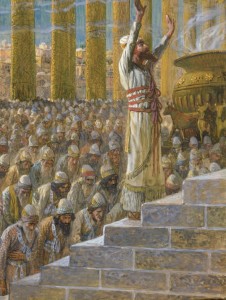
Dedicates the Temple
of Jerusalem
The Temple in Jerusalem as a House of prayer for the Israelites – individuals in times of need and the nation in times of crisis – is mentioned for the first time in King Solomon’s prayer. The Temple in Jerusalem would be a place where “every prayer and petition offered by a human being (Adam)… with palms turned toward this House, You will hear it up there in Heaven the place of Your Dwelling.” Beyond the particular peoplehood and nation King Solomon designated and consecrated the Temple as a universal house of prayer for all of humanity that would include “the strangers, the non-Israelite who is coming to pray in this House. You will hear their prayers up above in the place of Your Dwelling.” *
The commentator Abarbanel wondered, “What was the holiness of the Temple and its distinctive quality?” – since it was already promised in the Torah that people’s prayers will be heard everywhere, whether they lived in the Land of Israel or outside of it. Turning to God people’s prayers would be heard from all corners of the world, “God would disperse you among the nations…and if you search there for God you will find your God.” **
Abarbanel further asked, “If indeed the gates of Heaven are always open to prayer what is special about the House in Jerusalem?” To emphasize his question Abarbanel pinpointed to King Solomon’s prayer: “And You will hear in the place of Your dwelling” from every place, at any time that “a human being will come in prayer before you, outside the Temple.” For “You will hear them whenever they call unto you,” in other lands “and in their exile, right there, You will hear them.” *
However, Abarbanel identified a clear advantage to a prayer from “this House”: due to the sacredness of the space itself there will be an immediate response to prayers, “You will hear—and You will forgive.” Therefore, when the people would be exiled their prayers would travel metaphorically, “from the land of their enemies… in the direction of their land…of the city… and of the House which you have chosen.”*
While the prayer of non-Jews seems to come after the prayers of the People of Israel, Abarbanel’s view is that in King Solomon’s prayer it is not about the identity of the people but their proximity to the Temple. The prayer of a non-Jewish person who comes from far away to “this House,” is placed in the appropriate order before the prayer of the nation from outside the land.
In the last verses King Solomon returns to the universal message of his prayer of “this House” as a source of inspiration for the world. A people’s prayers constant and regular, a daily habit, will produce a universal recognition of one God, the Creator of the world, “so that all the nations of the world will acknowledge that You are God and there is no other.” * In the spirit of Isaiah’s vision, “From East to the West, all will know that I am God, there is no other god.” ***
—
* The quotes are from Kings 1 chapter 8.
** Deuteronomy 4: 27 – 29.
*** Isaiah 45:6.
Translated from the Hebrew by Ayala Emmett